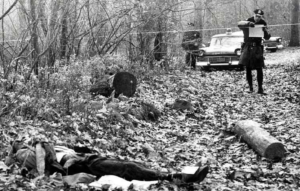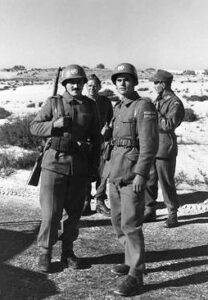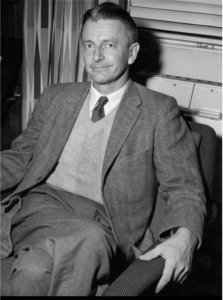
The Suicide That Might Not Have Been A Suicide
“…now that it is clear I will not retreat, that the circle outside the Secretariat, ultimately responsible for the sabotage, might have decided that it is necessary to risk having me disappear out of a window, or similarly in a fit of depression… My wife has nevertheless insisted that I should inform a few of my friends that under no circumstances would I commit suicide… this would be contrary to my whole nature and my religious convictions. If any note was found to the opposite effect in my handwriting, it would be a fake.” Povl Bang-Jensen, in a note written on 30 November 1957
Povl Bang-Jensen’s body was found on Thanksgiving Day – 26 November 1959 – laying across a trail in a park just minutes from his New York home. Missing for over 72 hours, he was holding a revolver in his right hand, and had been shot in his right temple. In his wallet was a suicide note that read, “Whatever faults I have, I have been honest and wanted to do good; but I underestimated the forces I was up against.” He was fifty-years-old.

The young United Nations of the 1950s, particularly as led by the revered Dag Hammarskjold, is viewed as a progressive humanitarian organization, concerned with the dignity of humanity and fair interaction between the countries of the world. Indeed, it was under Hammarskjold’s leadership that the first international UN peacekeeping force was deployed at the Suez Canal.

But at least one man employed by the United Nations, the Danish Povl Bang-Jensen, saw sinister shadows in the background and a vast failure on the part of the organization in regards to the 1956 Hungarian Revolution, the twin crisis to the Suez.
As Hungarian refugees streamed across the Austrian, and to a lesser extent Yugoslavia’s, border, the United Nations found themselves called upon to support transit camps, resettlement, and to gather a narrative of the displaced so that there was a record of what had happened. Bang-Jensen was sent to handle the logistics of arranging for refugee testimony as well as screening stories before they were heard by the main committee.

The stories horrified him. As the final report would state, “The verbatim records of the committee’s meetings contain appalling descriptions [which]… the committee would have hesitated to publish in their entirety, even if the necessity of protecting the families of the witnesses had not been an obstacle.”
But even with that admission, Bang-Jensen became increasingly uncomfortable with the manner in which the Special Committee on the Problem of Hungary (SpecCom) was recording the refugee testimony. Intimately familiar with the details, because he had interviewed them all before presenting them before the SpecCom, he noted over 40 errors and 20 omissions of key information in the final report. Reporting this to his direct supervisor, the British William M. Jordan, he was told the information was not a big deal and that he was not to report it.
The errors and omissions were not the only issues with the reports – Bang-Jensen clashed with Jordan over the translations and noted an incident where a Soviet UN staffer tried to bribe a secretary to allow him to take the transcripts home overnight. He was increasingly concerned and although he was told to stand down, he arranged for a meeting with a UN Committee, laying his concerns out. The meeting became contentious; when Bang-Jensen felt that committee members weren’t listening to him, he actually grabbed one and shook him by the lapels.
He was barred from future meetings and Hammarskjold personally had him removed from the Committee.
When the report was finally published, Bang-Jensen was not given a copy. He was told they were all “currently in use.” Nor did Bang-Jensen’s superiors stop merely at refusing his requests. He was eviscerated publicly, with aspersions cast as to his motives.
“He should be required forthwith to take sick leave, since I have no doubt Mr. Bang-Jensen is a very sick man,” said Jordan.
But the climax of the drama had not yet been reached. In October of 1957 a Hungarian facing deportation in the United States claimed they would be imprisoned and possibly executed upon return because they had been one of the 81 anonymous witnesses who had participated in the SecCom report. Well aware that the families of those interviewed would be in danger if names were given out, the UN committee had referred to them by initials in the official report – AAA, BBB, etc. There was only one list of names that cross-referenced those who had given testimony, and Povl Bang-Jensen had it in his possession.
After his desk had been broken into, Bang-Jensen, assuming the names were the target, had removed them to an undisclosed location off site. Suspicious of the UN bureaucracy that had dismissed his warnings about errors in the report, Bang-Jensen concluded that the only way to keep Hungarians from being killed (reports were circulated that the closest relative of insurgents were being executed as a stand-in for those who had escaped) was to remove the list from any location where it could be found and then refuse to hand it over.
The insinuation that the United Nations was either a) infiltrated or b) compromised, as well as the outright statement that the organization could not be fully trusted, was more than the Secretariat could bear. Bang-Jensen was summarily suspended from his job and marched off-site by security for removing the documents – but most likely also for causing the young organization lot of embarrassment.
After much negotiation and back-and-forth, Bang-Jensen and the Secretariat agreed that the documents would be brought, in a sealed envelope, and burned on the roof of the UN building, and on 24 January 1958 this was done in the presence of a neutral bank official and documents testifying to the destruction were signed.
The publicly available report released outlining the incident claimed the papers were worthless and had most likely been altered and created a picture of a mentally unstable Povl Bang-Jensen, declaring that he was in need of medical help.
As letters streamed into UN headquarters decrying the treatment of Bang-Jensen, the UN replied to each one by sending them a copy of the Gross Report, which questioned Bang-Jensen’s mental health.
Finally, in June of 1958, Bang-Jensen was fired without notice from his UN position for insubordination.
“I shall never regret that I kept my promise to the Hungarian witnesses that I should be the only person in the Secretariat to know their names,” said Bang-Jensen.
Povl Bang-Jensen did go through a strong period of depression following his dismissal, enough to see a psychiatrist six times. He also continued his advocacy, but this time for a group of Russians who wanted to defect and specifically felt that Bang-Jensen was the only person trustworthy enough to help them.
Bang-Jensen sought and was denied a meeting with the President to discuss the would-be defectors. He then sought a meeting with the Director of the CIA, Allen Dulles. Several meetings would take place, involving Dulles, his aides, and journalists. Before anything could be done about his information, however, the Soviet Union discovered the efforts of those who hoped to defect and transported them all back to Moscow. There is no further information about them available.
Povl Bang-Jensen left his New York house in his normal manner at the end of November and never returned. Three days later, on Thanksgiving Day, his body was found in a nearby park, an apparent suicide complete with a note. The note requested cremation, and that wish was followed.
But serious questions remained – Bang-Jensen was left handed, yet his pistol was found in his right hand and he had been shot in his right temple. Although he had disappeared three days earlier, he was freshly shaven – and the coroner estimated he had only been dead a few hours. He was under sedation – although he had not previously used the sleeping pills that sessions with his psychiatrist had prescribed for him. And despite early despondency after his abrupt firing, everyone who knew Bang-Jensen described a man who had worked through his demons and was more cheerful and upbeat.
Immediately, cries of foul play surfaced, and they were loud enough that Congress launched its own investigation in 1960. Although no definitive answer was given, evidence for Bang-Jensen’s murder was presented along with the evidence for it having been a suicide. The report also quoted from the United States Central Intelligence Agency as well, which would not be publicly refuted until papers from its archives were declassified in 2000. The false statement was that Bang-Jensen had never met with Director Dulles and had given the agency no information of any value.
The story of the possible political assassination of the man who had tried to hold the UN accountable and expose possible Soviet abuses and operatives has been told sporadically in the last sixty years, but is often dismissed as “right wing propaganda”. However, in the last few years even biographers of Dag Hammarskjold have begun to soften toward Bang-Jensen and portray him with far more sympathy.
In the end, the best summary of the situation is probably the one recorded in the CIA secret files and not released until 2000:
The Central Intelligence Agency is at the very least guilty of two grievous sins of the kind to which ingrown bureaucracies are prone: a sin of major omission, in failing to follow up, immediately and fully, the lead offered by Bang-Jensen’s approach-even if that lead proved a false scent; a sin of shameless commission, in now trying to cover its own tracks at the expense of its country’s interest and a brave man’s honor.
For more in our ongoing series on the Hungarian Revolution, click here.
- November 30, 2020
- History
